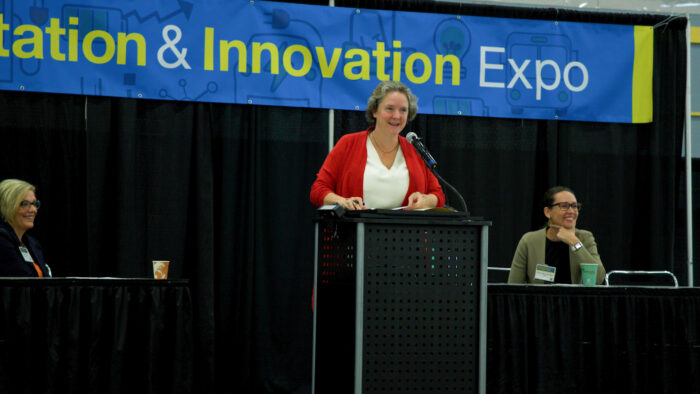The City of Madison, Wisconsin has gone all-in on a citywide commitment to reduce greenhouse gas emissions and avoid the worst impacts of climate change. Madison has set the bold goal of reaching 100% renewable energy and net zero carbon emissions for city operations by 2030, and community-wide by 2050.

Satya Rhodes-Conway, mayor of Madison, Wisconsin, praised the city’s use of biobased products at the October 2023 Transportation and Innovation Expo.
In pursuit of this ambitious goal, the city has embraced a range of biobased products – products that replace some petroleum-based ingredients with rapidly renewable resources like soy.
Mahanth Joishy, who joined the city’s fleet services department as superintendent in 2017 after serving as director of safety for New York City’s fleet, and his team have been a driving force in Madison’s push toward biobased products.
Under Joishy’s leadership, the City of Madison has purchased over 1,000 Goodyear tires containing soy. Joishy even switched to Skechers work boots that are made with the same soybean oil technology. Madison has also used thousands of gallons of soy-based biodiesel in its diesel vehicles.
Some of these products – as well as the city’s commitment to them – were prominently showcased at the October 2023 Madison Transportation and Innovation Expo. Mayor Satya Rhodes-Conway addressed the more than 300 attendees.
“The City of Madison is proud of our work to reduce the environmental footprint of our fleet,” Rhodes-Conway said. “We’re buying soybean tires for our fleet vehicles because it supports Wisconsin farmers, and they are a high-quality, sustainable product, reducing our environmental footprint.”
The mayor complimented the city’s work with the United Soybean Board, the Wisconsin Soybean Marketing Board and biodiesel-producer Chevron REG, among others. The city uses biodiesel blends in most of its diesel vehicles, and it has a project to use 100% biodiesel for some heavy-duty vehicles, working with the company Optimus Technologies.
“All of our biodiesel supply comes exclusively from Wisconsin-grown soybean and other local feedstocks,” the mayor said.
“The City of Madison’s efforts is an exciting example of the many ways U.S. Soy delivers sustainable solutions to lives,” said United Soybean Board director, Sara Stelter, Wisconsin. “We applaud Madison as a role model of sustainability leadership and look forward to their continued progress toward achieving their carbon reduction goals.”
In an earlier milestone achieved in 2023, Joishy helped his city take another step toward net zero by leading Madison to become the first Wisconsin fleet to graduate from the Biobased Academy®. The American Lung Association created the comprehensive training program to educate professionals on the operational, health, safety, and environmental benefits of biobased alternatives. The USB partnered with the Lung Association to offer the online training at no cost to participants. In addition to the Biobased Certified Fleet Professional course, the Lung Association will soon launch a Biobased Certified Property and Facilities Professional course, which creates another educational tool for Madison as well as other communities and businesses to boost their carbon goals with soy-biobased products.
“I’m confident that by adopting a range of sustainable practices, we can meet our carbon reduction goals,” Rhodes-Conway said.
Because of the potential for biobased products to create new markets for soybeans, U.S. soybean farmers have invested millions of dollars to research, test and promote biobased products. Much of this work was done through the United Soybean Board, which is composed of 77 U.S. soybean farmers appointed by the U.S. Secretary of Agriculture to invest soybean checkoff funds. As stipulated in the Soybean Promotion, Research and Consumer Information Act, USDA’s Agricultural Marketing Services has oversight responsibilities for the soybean checkoff.

